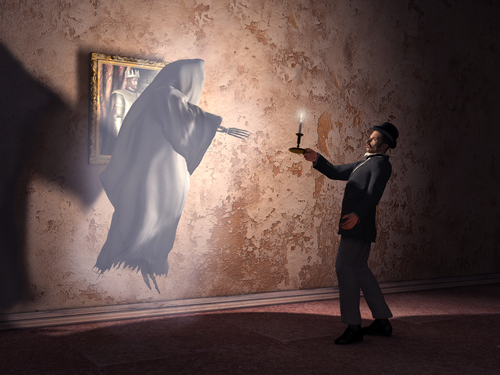
What are ghosts? That’s a million-dollar question, isn’t it? Heck, it’s probably worth far more than a million dollars at this point. If anyone can ever answer it, that is. Which no one has definitively done yet, so for now ghosts remain myths and folklore.
Even without concrete proof, however, some people are already making money “showing” people “ghosts.” From television networks like Travel Channel and all their stars with their ghost hunting shows to ghost hunting event and ghost tour companies.
Heck, even I’m making money from this blog. Not a lot. I couldn’t keep a rabbit in lettuce, but I do make a little in ads to help offset my hosting fees.
But what are we really seeing or hearing when we’re presented with “evidence” of ghosts?
In some cases, like on the ghost tours, we’re only hearing stories.
On the paranormal TV shows, there’s plenty of “proof” they’re catching something, from disembodied voices, shadowy figures, and even things moving on their own. It all appears very scientific and professional, but how trustworthy is any of that? Not only can producers manipulate circumstances and creatively edit to make it seem like something is happening, but there’s the matter of optical illusions, as well as audio and visual pareidolia.
I’m not here to debate the veracity of any of the alleged evidence.
I am here to question what ghosts are. Are they real? Could they even really exist? If so, what are they made of? And do any really wear sheets?
Because understanding ghosts, or at least the concept of them and why we believe in their existence…or not, is the foundation for this whole Schooled by Ghosts series of mine. So let’s dig in.
Ghosts Defined
What are ghosts? First, we have to define them. If we can.
Definition 1: Webster’s
My old Webster’s New World Dictionary Second Edition copyrighted 1986 defines ghosts in several ways, but I found the first two the most interesting.
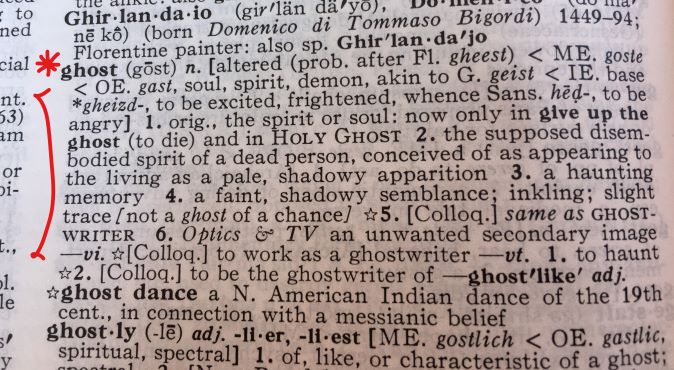
I would’ve thought the second definition, “the supposed disembodied spirit of a dead person, conceived of as appearing to the living as a pale, shadowy apparition,” was the only definition. It’s the one I think of first when I think ghosts. What about you?
Also interesting is the use of the word “supposed.” Because, again, ghosts are not real. Many believe they are, but it all leads back to the tiny problem of no one has produced definitive proof of their existence.
But this is just a general starting place. Let’s examine another source.
Definition 2: Rosemary Ellen Guiley’s Encyclopedia of Ghosts and Spirits
Another place ghosts are defined is in The Encyclopedia of Ghosts and Spirits.
Psst. HJ is an Amazon Affiliate. This post may contain Amazon links. If you click through and end up buying anything, we may earn a small commission. Thanks! For more info, see our affiliate policy.
This encyclopedia has a much longer and more comprehensive assessment for determining what ghosts are. It takes up one full two-column page in the book and half of another, and examines everything from how various cultures and religions view ghosts (some believe they’re evil, some believe they can’t exist at all) to where and when ghosts are seen (contrary to popular belief, not always at night and mostly not in graveyards). It also examines different types of ghosts (intelligent vs. residual) and reasons ghosts might come back (for revenge, to complete unfinished business, or because they’re stuck here).
But the very first sentence succinctly sums it up best: “An alleged spirit of the dead.”
Again, note the wording. Webster’s definition used “supposed.” This encyclopedia uses “alleged.”
So, according to reference book definitions of ghosts, we know they’re not real.
But we also get the sense they’re a complex, and maybe even complicated, idea. Let’s look at thoughts about what they’re made of and see if that yields any more clues.
What are ghosts made of?

If ghosts represent the spirit of dead people, what are spirits made of? Does the soul have substance?
I personally love the way Scientific American questions it:
If you claim that some form of soul persists beyond death, what particles is that soul made of? What forces are holding it together? How does it interact with ordinary matter?
There’s undeniably some form of energy involved in the “spirit energy” that exists within us while we’re alive. Everyone wants to know what happens to that spark when we die, and, if it sometimes comes back or lingers, how does it do that? What “powers” it, so to speak?
Is there an electrical component? Lots of modern-day ghost hunters believe the more gadgets they have, the more proof they’ll gather. But without knowing if ghosts have electrical impulses, give off heat, make sound, or even have a form (maybe they’re just some kind of gas?), gadgets aren’t really reliable tools.
They are a lot of fun though, and they do offer a lot of excitement. And perhaps some of them really are picking up on some sort of spiritual energy.
But since no one has been able to figure out the formula for consistently replicating evidence using any of these devices, we’re technically still in the dark as to what’s being “captured.”
So what do we rely on to catch ghosts with then?
How do you catch a ghost?
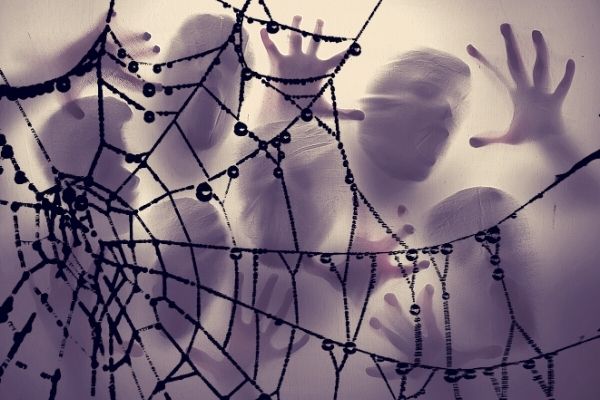
How can we “catch” something if we don’t even know (a) if it really exists or (b) what it’s made of?
Well, we can’t and that’s why no one has done it yet. No matter how many photos, videos, or audio recordings they offer to show you to prove that they have.
So what have they “caught” then? Is it even possible to catch a ghost?
Do we bait a hook like when we go fishing? Do we set a trap? Or do we lay in wait somewhere?
Well, like with hunting and fishing, first we go where the ghosts are: allegedly haunted places.
Then…well, that’s where it gets tricky. Because again we’re back to, “What are ghosts made of?”
How can we know which tools to bring if we don’t know what will capture them, or what will even encourage them to manifest?
Put it this way, you wouldn’t throw a bear trap in a lake to catch a minnow.
But perhaps the even better questions are: “What do ghosts like to do? Do ghosts eat? If so, what do ghosts like to eat?”
The more we know not only about what they’re made of, but their habits, behaviors, and preferences, the more likely we are to “catch” one.
Ghost Hunting Methods
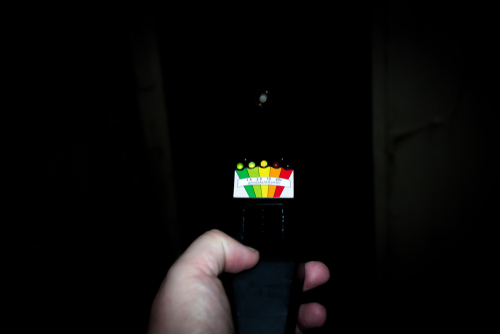
In order to catch a fish, you bait a hook with something you know the type of fish you’re after likes to eat. Which varies from fish to fish, right? Some prefer worms, some prefer bugs, others want smaller fish, shrimp, or even crawdads.
When it comes to hunting animals, techniques also vary. Bait is sometimes used to lure an animal into a trap or to a certain area where a hunter is waiting to kill it. Again, bait is adjusted to the type of animal they’re after since diets vary among species.
Other times hunters just position themselves in an area they know the animal is likely to come through and they lay in wait until one does. Other methods involve tracking.
Ghost hunting utilizes all those methods to some modified extent or another depending on who’s doing it, their personal preference, and the situation they’re in.
But this is another reason why ghosts have remained in the “alleged” and “supposed” realm of existence. Unlike hunters and fishermen who trade tactics for which types of bait and techniques they use to catch whatever they’re hunting and fishing, ghost hunters can’t.
Or maybe it’s more a matter of they don’t.
Why? Well, that’s almost as complicated as trying to answer: “What are ghosts?” We’ll have to delve into that some other time.
What do ghosts look like?

Are they all-white and see-through? Do they glow? Do they look like real people? Or do they look like white misty masses, or solid black ones?
Do they look like their corpse or the age they were when they died? Or some other point of time that they determine?
Do they look like a real person until they disappear? Why did some people used to describe ghosts as wearing sheets and rattling chains? Why don’t they do that anymore? (That’d be cool to capture on video though, wouldn’t it?)
People who have claimed to see ghosts have reported varying descriptions of their visual experiences. I’m not actually sure if anyone ever reported seeing a ghost in a sheet or rattling chains or if that was a fictional invention. If you know, let me know!
However, people have described some specters as
being see-through and others could’ve sworn they were looking at a flesh-and-blood person until it vanished into thin air.
How can we catch something if we don’t know what we’re actually looking for –or even at? There could be something right in front of our eyes we’re missing because we’re focusing on something else entirely.
So is there another way to know if a ghost is around?
What do ghosts smell and sound like?
Do ghosts smell like the perfume or cologne they wore? Or their body odor if they didn’t wash or wear a scent? The cigarettes or cigars they smoked? The beer or liquor they drank? Their favorite flower?
And how do ghosts sound? There’s always the good old-fashioned stereotypical rattling chains or moaning. (Which, again, did that really ever happen or was it just part of a story?) The most common reports these days are disembodied voices crying, giggling, whispering, talking, and once in a while even screaming.
It stands to reason that if ghosts are spirits of people, people produce a variety of smells and sounds. Perhaps they bring a part of that with them in their spiritual energy?
Or perhaps the odors have just been trapped in fabrics and other materials. Perhaps certain conditions, like heat or humidity, release them at certain times. Perhaps some people with a more keen sense of smell pick up on that.
But what about the sounds? Could they be echoes from the past or voices reaching out from the beyond?
Or could it be misinterpreted wind gusts, overactive imaginations, auditory hallucinations brought on by allergies, high electrical magnetic fields, or sickness?
Like so much of what we experience with the paranormal, we don’t always know exactly what’s happening when people encounter phantom smells and sounds. It could be one of many ways ghosts are trying to communicate with the living.
Speaking of…
Can ghosts communicate with the living?
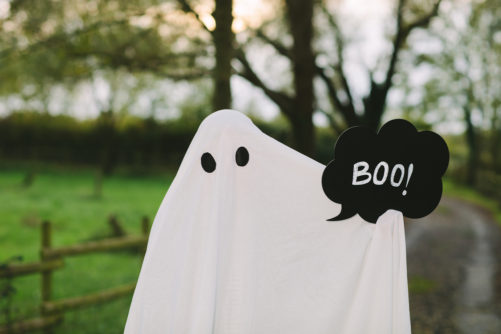
Do ghosts know how to use Ouija boards? Or how to seek out spirit-mediums to channel them? Are they technologically savvy enough to manipulate phones, computers, spirit boxes, and K2 meters? And what about turning flashlights on and off? How do they physically muster the power to do that?
What about EVPs? Are recorders really picking up voices answering questions that no one heard the responses to at the time, or is it a case of a technological glitch or auditory pareidolia?
Why do some ways of communicating with ghosts seem to work at certain times and for certain people but not all the time and not for everybody?
Trying to talk with ghosts is an imprecise science. Well, calling it a “science” is probably not the best word choice. “Activity” or “exercise” may be better.
YouTube is loaded with great “evidence” of people capturing voices from the Beyond, but we’re back to square one: is it really proof of ghosts or not?
So, what are ghosts?
Are they real or illusion? A hopeful ideal or an imaginative invention?
The only thing that’s certain is that the question sparks a never-ending search for answers and results in a mystery that still remains unsolved.
But that’s also what makes looking for ghosts and proof of them so interesting and exciting.
Check-In
Have you ever seen a ghost?
Courtney Mroch is a globe-trotting restless spirit who’s both possessed by wanderlust and the spirit of adventure, as well as obsessed with true crime, horror, the paranormal, and weird days. Perhaps it has something to do with her genes? She is related to occult royalty, after all. Marie Laveau, the famous Voodoo practitioner of New Orleans, is one of her ancestors. That could also explain her infatuation with skeletons.
Speaking of healing, to learn how she channeled her battle with cancer to conjure up this site, check out HJ’s Origin Story.


Great post with lots to think about. I guess we won’t know all the answers until we ourselves are dead.
LOL! Way to sum it up perfectly, Priscilla!